The Latest: Nobel-winning scientists laud each other, team
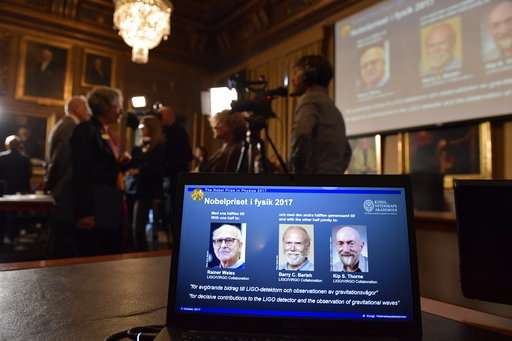
The Latest on the Nobel Physics Prize (all times local):
8:30 p.m.
The two California scientists sharing this year's Nobel Physics Prize credited each other and their third partner, as well as the team that helped build and maintain the instrument that helped them discover gravitational waves.
Kip Thorne and Barry Barish of the California Institute of Technology spoke Tuesday at the school about 12 miles northeast of Los Angeles, just hours after learning they had won.
The pair, along with Rainer Weiss of the Massachusetts Institute of Technology, were honored for their observation of gravitational waves, which Einstein first predicted a century ago.
Barish said the laser device, called an interferometer, is "one of the best and most amazing instruments ever built by mankind." He gave credit to administrators, scientists, students and government officials he said were behind its creation.
Thorne said the instrument would create new science for centuries to come.
___
4:30 p.m.
Rainer Weiss, the scientist who won this year's Nobel Physics Prize together with two others for their discoveries in gravitational waves, says he would love to be able to talk to Albert Einstein about their win.
Speaking at his home in Newtonville, Massachusetts, Weiss said he'd pleased if he could tell Einstein his team had seen the faint waves and detected black holes, "which (Einstein) was very skeptical about and that was, in fact, the very first thing we detected."
Weiss and his co-winners were recognized Tuesday for their observation of gravitational waves, which Einstein first predicted a century ago. Einstein did not believe they could ever be measured.
Weiss also said that the win affirmed the importance of the scientific process at a worrying time "when rational reasoning associated with evidence isn't universally accepted."
___
1:30 p.m.
Kip Thorne, one of three scientists sharing this year's Nobel Physics Prize for their discovery in gravitational waves, says the award is "a win for the human race as a whole."
"These gravitational waves will be powerful ways for the human race to explore the universe - not for the next few years or decades but for the next few centuries," Thorne, of the California Institute of Technology, told The Associated Press.
Thorne shared the award with Rainer Weiss of the Massachusetts Institute of Technology and Barry Barish, also of CalTech for their observation of faint ripples flying through the universe called gravitational waves. The waves were first predicted by Albert Einstein a century ago, but Einstein was convinced they could never be measured.
Thorne said he was a "little disappointed" that thousands other scientists who have worked on the project did not get to share the prize, adding: "Nevertheless I'm tremendously pleased to accept this" on their behalf.
___
1:20 p.m.
Clifford Will, a gravitational-wave expert at the University of Florida, says it was "fabulous" that the Nobel Physics Prize went to three scientists for their discovery in gravitational waves.
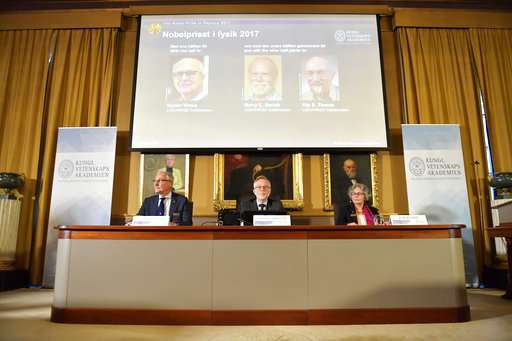
Observing gravitational waves is important because they offer a new way to observe the universe, beyond light and particles, Will said. When two black holes merge, for example, they don't give off observable light. But with gravitational waves, "you can see these events." Or rather, hear them, since they are detected as if they were chirping sounds.
Will said that in the merger of the two black holes that triggered the prize-winning detection, the event gave off more energy in the last two-tenths of a second than all the stars in the visible universe combined emitted during the same period. But on Earth, that was "very difficult to detect" and required extremely precise instrumentation, he said.
"There's a very loud future for gravitational waves," he said. The next detections might come from the merger of two ultra-dense neutron stars, or a neutron star colliding with a black hole, he said.
___
1 p.m.
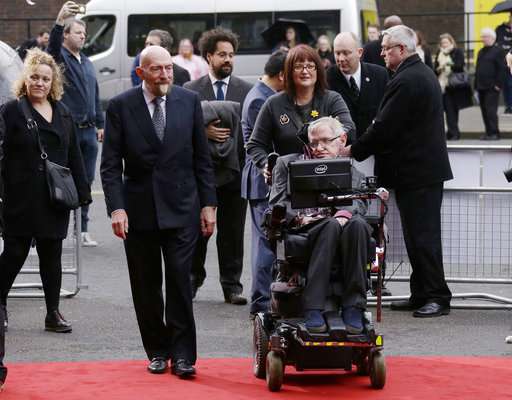
Barry Barish, one of the scientists sharing this year's Nobel Physics Prize, said he had set an alarm in anticipation of a call from the Nobel team—though when it did come it beat his alarm.
Barish, speaking by phone from Santa Monica, California, said he and his colleagues knew there was a good chance they would get recognized by the Nobel team. The call came at 2:41 a.m., beating his own alarm by 4 minutes.
"There was some anticipation. But, the Swedish Academy is so secretive," he told The Associated Press.
He added Tuesday's announcement was "a win for Einstein, and a very big one."
Barish shared the award with Rainer Weiss of the Massachusetts Institute of Technology and Kip Thorne of the California Institute of Technology for their discoveries in faint ripples flying through the universe called gravitational waves. The waves were first predicted by Albert Einstein a century ago, but Einstein was convinced they could never be measured.
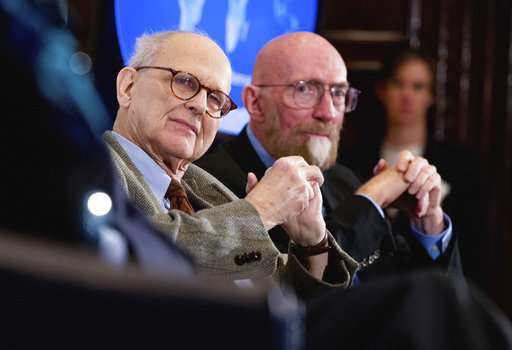
___
11:55 a.m.
The Nobel Physics Prize 2017 has been awarded to three scientists for their discoveries in gravitational waves.
The three are Rainer Weiss of the Massachusetts Institute of Technology and Barry Barish and Kip Thorne of the California Institute of Technology.
The German-born Weiss was awarded half of the 9-million-kronor ($1.1 million) prize amount and Thorne and Barish will split the other half.
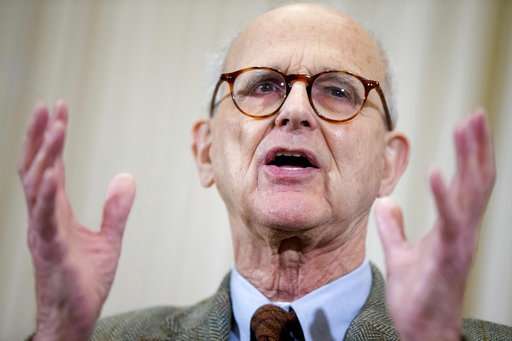
___
7:10 a.m.
The Nobel Physics Prize honors big discoveries involving materials often too small to be seen by the naked eye.
The 2017 prize being announced Tuesday by Sweden's Royal Academy of Sciences comes with 9 million kronor ($1.1 million). For the past 25 years, the prize has been shared among multiple winners.
The 2016 prize went to three British-born researchers who applied the mathematical discipline of topology to help understand the workings of exotic matter such as superconductors and superfluids. In 2014, a Japanese and a Canadian shared the physics prize for studies that proved that the elementary particles called neutrinos have mass.
This year's Nobel medicine prize went Monday to three Americans studying circadian rhythms—better known as body clocks: Jeffrey C. Hall, Michael Rosbash and Michael W. Young.
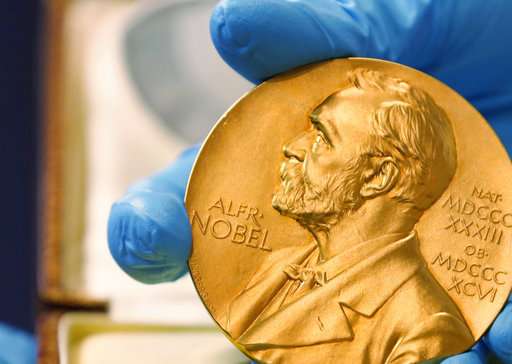
© 2017 The Associated Press. All rights reserved.



















